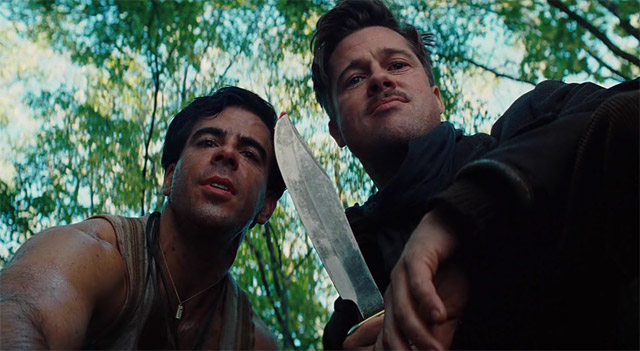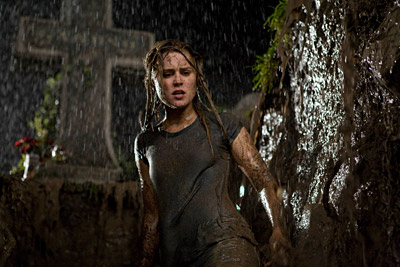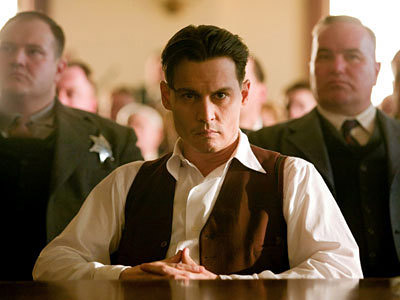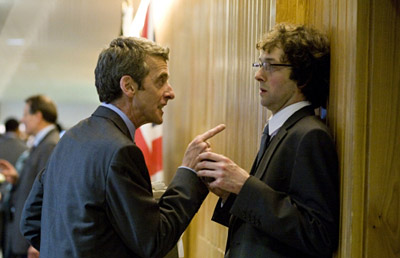The Best Films of 2009
By Bert Ehrmann
January 22, 2010
The best film of 2009 was writer/director Quentin Tarantino's Inglourious Basterds.

Admittedly, I am a big fan of writer/director Quentin Tarantino. There are very few films of his that I don't consider classics and I'm one of the few who found his last film Deathproof as part of Grindhouse (2007) brilliant. Needless to say, when Tarantino's latest film Inglourious Basterds about a Dirty Dozen-esque team of allied agents fighting Nazis during WWII was announced I found myself giddy with excitement.
Basterds is really three or four interconnected stories set in France behind enemy lines during WWII. One story follows "The Bastards," a team of Jewish soldiers lead by southern madman Aldo Raine (Brad Pitt) sent into occupied France to sew blood and destruction onto the German occupiers. Another is that of Shosanna Dreyfus (Melanie Laurent), a Jew on the run from legendary Nazi "Jew Hunter" Hans Landa (Christoph Waltz) who was responsible for the death of Dreyfus' entire family. And that's not to mention a German actress/double agent Bridget von Hammersmark (Diane Kruger) or Mike Myers turning up as a British army officer or how all these separate plotlines come crashing together at the end in a movie theater in a stunning finale.
 Watchmen: The Ultimate Cut: When I saw Watchmen in theaters I liked the film a great deal. However, there were other movies that came out later in the year that I liked more and, in all honesty, Watchmen probably would've appeared (at best) at the bottom of this list. That was before I saw the DVD/Blu-ray extended edition of Watchmen: The Ultimate Cut that was released late in '09. This version of Watchmen is nearly an HOUR longer than the theatrical release and fixes many of the story and pacing issues that I had with that version of the film. Plus the animated Watchmen companion Tales from the Black Freighter short film that was released on DVD earlier this year has been edited into The Ultimate Cut making this version of Watchmen as close to the comic book version of the story as anything I think we'll ever see.
Watchmen: The Ultimate Cut: When I saw Watchmen in theaters I liked the film a great deal. However, there were other movies that came out later in the year that I liked more and, in all honesty, Watchmen probably would've appeared (at best) at the bottom of this list. That was before I saw the DVD/Blu-ray extended edition of Watchmen: The Ultimate Cut that was released late in '09. This version of Watchmen is nearly an HOUR longer than the theatrical release and fixes many of the story and pacing issues that I had with that version of the film. Plus the animated Watchmen companion Tales from the Black Freighter short film that was released on DVD earlier this year has been edited into The Ultimate Cut making this version of Watchmen as close to the comic book version of the story as anything I think we'll ever see.
 Moon: I honestly can't understand why Moon has been so overlooked by both the fans and critics this awards season. It's the most unique sci-fi film I've seen since The Matrix and Sam Rockwell's performance as the sole occupant of a mine located on the far side of the Moon is spectacular.
Moon: I honestly can't understand why Moon has been so overlooked by both the fans and critics this awards season. It's the most unique sci-fi film I've seen since The Matrix and Sam Rockwell's performance as the sole occupant of a mine located on the far side of the Moon is spectacular.
 The Girlfriend Experience: The Girlfriend Experience might be the most challenging movie I've seen in quite some time. Not only is the story of the film told in a very disjointed manner, where scenes take place out of order we're also never completely sure as to all the character's motivations. And while this level of confusion would kill a lesser film, somehow director Stephen Soderbergh along with writers David Levien and Brian Koppelman make it all work here.
The Girlfriend Experience: The Girlfriend Experience might be the most challenging movie I've seen in quite some time. Not only is the story of the film told in a very disjointed manner, where scenes take place out of order we're also never completely sure as to all the character's motivations. And while this level of confusion would kill a lesser film, somehow director Stephen Soderbergh along with writers David Levien and Brian Koppelman make it all work here.
 Drag Me to Hell: I've taken a lot of flack for my love of Drag Me to Hell. But when any movie features a puss spewing witch who's dispatched by an anvil drop to the head I'll call that film one of the best of the year everytime!
Drag Me to Hell: I've taken a lot of flack for my love of Drag Me to Hell. But when any movie features a puss spewing witch who's dispatched by an anvil drop to the head I'll call that film one of the best of the year everytime!
 Public Enemies: Many people disliked director Michael Mann's use of (sometimes) grainy digital video with Public Enemies, claiming that period pieces like Enemies should be filmed in the slick movie making techniques of old. But what I thought Mann was trying to do with Enemies was to not bring the viewers back to the 1930s but instead bring the 1930s to the present day by showing that period via a modern film making style. And that can be a bit uncomfortable; to see events in the past treated in the same manner as the present. But when it comes down to it, I'd rather be a bit uncomfortable and see a film maker like Mann try something a bit different than him making a movie that's just like a dozen other movies that has come before.
Public Enemies: Many people disliked director Michael Mann's use of (sometimes) grainy digital video with Public Enemies, claiming that period pieces like Enemies should be filmed in the slick movie making techniques of old. But what I thought Mann was trying to do with Enemies was to not bring the viewers back to the 1930s but instead bring the 1930s to the present day by showing that period via a modern film making style. And that can be a bit uncomfortable; to see events in the past treated in the same manner as the present. But when it comes down to it, I'd rather be a bit uncomfortable and see a film maker like Mann try something a bit different than him making a movie that's just like a dozen other movies that has come before.
 In the Loop: The antithesis of The West Wing, the main conceit of In the Loop is that politicians might be more interested in consolidating power and promoting their own careers than doing anything akin to serving the public good.
In the Loop: The antithesis of The West Wing, the main conceit of In the Loop is that politicians might be more interested in consolidating power and promoting their own careers than doing anything akin to serving the public good.